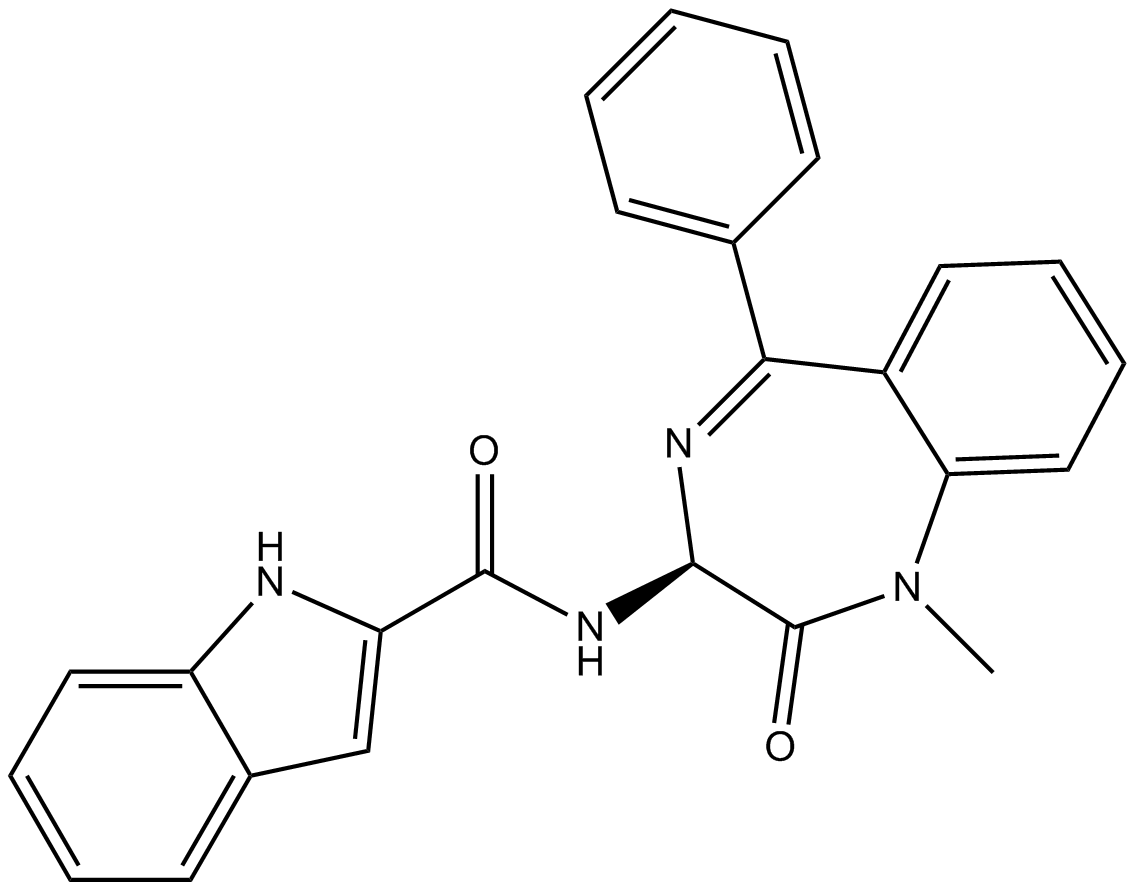Devazepide |
| Catalog No.GC18139 |
Antagonista del receptor CCK1 (CCK-A), activo por vía oral.
Products are for research use only. Not for human use. We do not sell to patients.

Cas No.: 103420-77-5
Sample solution is provided at 25 µL, 10mM.
Devazepide is a potent CCK-A receptor antagonist with IC50 of 0.26 nM. [1]
Cholecystokinin (CCK) has long been recognized as the dominant regulator of gallbladder contraction. The cholecystokinetic activity of different fragments of CCK in human has been established in several studies both in vivo and in vitro. There are two subtypes of CCK receptor that were identified, CCK-A and CCK-B. CCK-A are mainly located in peripheral tissues but also found in brain, while CCK-B distribute throughout the rodent central nervous system.
Devazeptide inhibitory effect against sulphated C-terminal octapeptide of cholecystokinin (CCK-8) on total [3H] inositol phosphate accumulation in CHO-AI cells was investigated. The results revealed that devazepide possesses an inhibitory effect with IC50 of 0.26 ± 0.06 nM. CCK-8 is considered to be the most potent endogenous anti-opiate agent. Morphine analgesia could be antagonized by treatment of CCK-8. However, the effect of CCK-8 could be reversed by devazeptide which could also potentiate analgesia of morphine greatly at doses of 50ng and 200ng. [2, 3]
Devazepide is a benzodiazepine derivative that interacts competitively with rat pancreatic CCK receptors as determined by Scatchard analysis against the specific binding of 125I-labelled CCK. In guinea-pig isolated ileum and colon, devazepide competitively blocked CCK-induced contractions with a potency greatly exceeding that of other non-peptide CCK antagonists such as proglumide, dibutyryl cyclic GMP and benzotript. It is confirmed that devazepide is a highly potent CCK-OP antagonist in this tissue. [4]
References:
[1] Dickenson, John M. , and Stephen J. Hill. "Synergistic interactions between human transfected adenosine A 1 receptors and endogenous cholecystokinin receptors in CHO cells."?European journal of pharmacology?302.1 (1996): 141-151.
[2] Lavigne, G. J., W. R. Millington, and G. P. Mueller. "The CCK-A and CCK-B receptor antagonists, devazepide and L-365,260, enhance morphine antinociception only in non-acclimated rats exposed to a novel environment."Neuropeptides?21.2 (1992): 119-129.
[3] Pu, Su-Fen, Hui-Xin Zhuang, and Ji-Sheng Han. "Cholecystokinin octapeptide (CCK-8) antagonizes morphine analgesia in nucleus accumbens of the rat via the CCK-B receptor."?Brain research?657.1 (1994): 159-164.
[4] D'amato, M. , I. F. Stamford, and A. Bennett. "Studies of three non‐peptide cholecystokinin antagonists (devazepide, lorglumide and loxiglumide) in human isolated alimentary muscle and guinea‐pig ileum."?British journal of pharmacology?102.2 (1991): 391-395.
Average Rating: 5 (Based on Reviews and 17 reference(s) in Google Scholar.)
GLPBIO products are for RESEARCH USE ONLY. Please make sure your review or question is research based.
Required fields are marked with *




















